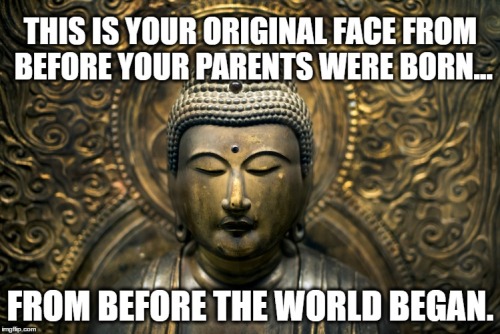Popularly, Amitabha is somebody else. He is some great compassionate being who looks after you. Esoterically, Amitabha is your own nature; Amitabha is your real self, the inmost boundless light that is the root and ground of your own consciousness.
You don’t need to do anything to be that. You are that, and saying Nembutsu (NAMU-AMIDA-BUTSU) is simply a symbolical way of pointing out that you don’t have to become this, because you are it.
And Nembutsu, therefore, in its deeper side builds up a special kind of sage, which they called myoko-nin. Myoko-nin in Japanese means “a marvelous fine man,” but the myoko-nin is a special type of personality who corresponds in the West to the holy fool in Russian spirituality, or to something like the Franciscan in Catholic spirituality. I will tell you some myoko-nin stories because that is the best way to indicate their character.
One day a myoko-nin was traveling and he stopped in a Buddhist temple overnight. He went up to the sanctuary where they have big cushions for the priests to sit on, and he arranged the cushions in a pile on the floor and went to sleep on them. In the morning the priest came in and saw the tramp sleeping and said, “What are you doing here desecrating the sanctuary by sleeping on the cushions and so on, right in front of the altar?” And the myoko-nin looked at him in astonishment and said, “Why, you must be a stranger here, you can’t belong to the family.”
In Japanese, when you want to say that a thing is just the way it is, you call it sonomama. There is a haiku poem that says, “Weeds in the rice field, cut them down, sonomama, fertilizer.” Cut the weeds, leave them exactly where they are, and they become fertilizer, or sonomama. And sonomama means “reality,” “just the way it is,” “just like that.“
Now, there is a parallel expression, konomama. Konomama means "I, just as I am.” just little me, like that, with no frills, no pretense, except that I naturally have some pretense. That is part of konomama. The myoko-nin is the man who realizes that “I, konomama-just as I am-am Buddha, delivered by Amitabha because Amitabha is my real nature."
If you really know that, that makes you a myoko-nin, but be aware of the fact that you could entirely miss the point and become a monkey instead by saying, "I’m all right just as I am, and therefore I’m going to rub it in-I’m going to be going around parading my unregenerate nature, because this is Buddha, too.” The fellow who does that doesn’t really know that it’s okay. He’s doing too much, and he is coming on too strong. The other people, who are always beating themselves, are making the opposite error.
The Middle Way, right down the center, is where you don’t have to do a thing to justify yourself, and you don’t have to justify not justifying yourself. So, there is something quite fascinating and tricky in this doctrine of the great bodhisattva Amitabha, who saves you just as you are, who delivers you from bondage just as you are.
You only have to say “NAMU-AMIDA-BUTSU.“
https://terebess.hu/english/watts5.html
